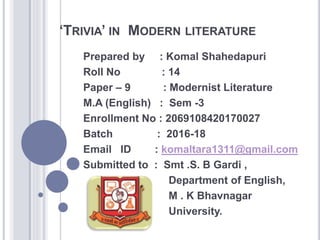'Trivia°Ø in modern literature
- 1. °ÆTRIVIA°Ø IN MODERN LITERATURE Prepared by : Komal Shahedapuri Roll No : 14 Paper ®C 9 : Modernist Literature M.A (English) : Sem -3 Enrollment No : 2069108420170027 Batch : 2016-18 Email ID : komaltara1311@gmail.com Submitted to : Smt .S. B Gardi , Department of English, M . K Bhavnagar University.
- 2. WHAT IS TRIVIA ? ? Trivia is unimportant facts or details that are considered to be amusing rather than serious or useful. ? It is all about our routine schedule, things which are necessary but not important. ? It°Øs an anti-Aristotelian idea which believe that great things/events are basic canon of literature. Ex, Hamlet but in Postmodernism, all common/trivial things are basic canon of literature.
- 3. TRIVIA IN THE BIRTHDAY PARTY ? The subject in both the play and film seems to be °ÆTrivia°Ø, the atmosphere of menace created through trivial objects. ? Trivia magnified in movie more than the play through the camera language, magnification techniques and sound & visual effects. ? Harold Pinter°Øs purpose in both film and play is to magnify trivia.
- 4. CONTINUE°≠. Trivial Objects ? Drum ? Newspaper ? Cooking ? Spectacles ? Mirror ? Doors ? Street Light ? Mess in Stanley°Øs room ? Chairs and Birds ? Window
- 5. CONTINUE°≠.. Trivial Dialogues like ? Meg : What is it Girl or Boy? I°Ød be sorry, I°Ød rather have a little boy. ? Goldberg and McCann : Why did you kill your wife and how? Why did you don°Øt marry her ? she is waiting in the Church. Why did you change your name? ? Petey: Don°Øt let them tell you what to do. ? Interrogation and Birthday Party Scenes ? Blind man's Buff game is too common or normal but have deep meaning.
- 6. WAITING FOR GODOT ? Samuel Beckett has also used Triviality in his play °ÆWaiting for Godot°Ø to give deep and important lessons of life. ? Most of the dialogues and actions that happen between two major characters Estragon and Vladimir are almost trivial but left the deep messages. ? By the use of triviality, author wants to give deep and significant message to the audience.
- 7. CONTINUE°≠ ? In essay °ÆThe Search for Self°Ø, Martin Esslin said that when play was performed in front of the prisoners in a jail , they can understand the deep message of the play because they can relate their own situations with the play. ? But among the normal audience who don°Øt know anything about the play or literary aspects, they can°Øt understand play in a proper way that which meaning play wants to convey to the audience. ? In play Breath, Beckett has also used trivial objects to convey deeper meaning like mess of fruits, medical objects etc with menacing sound.
- 8. Trivial Objects/Characters ? Boy as messenger ? Pozzo as a Master ? Lucky as a Slave ? Vladimir as Practical man ? Estragon as a Poet ? Country Road ? Hats & Boots ? Tree ? Debris ? Night & Moon
- 9. ? Estragon : Nothing to be done.. ? Estragon: Let's go. ? Vladimir: We can't. ? Estragon : Why not? ? Vladimir : We're waiting for Godot. ? Estragon: Nothing happens, nobody comes, nobody goes, it's awful! ? ESTRAGON: What is it? ? VLADIMIR: I don't know. A willow. ? ESTRAGON: Where are the leaves? ? VLADIMIR: It must be dead. ? ESTRAGON: No more weeping. ? VLADIMIR: Or perhaps it's not the season. ? ESTRAGON: Looks to me more like a bush. ? VLADIMIR: A shrub. ? ESTRAGON: A bush. Trivial Dialogues
- 10. TO THE LIGHTHOUSE ? Simple plot not of great events but routine lifestyle signify important aspects of life. Trivial Objects signify deep meanings ? Cutting image of Refrigerator ? Boar°Øs Skull ? Painting ? Lighthouse ? Fisherman°Øs story
- 11. TRIVIAL BOLLYWOOD SONGS Examples, ? Sooraj Dooba Hai from movie Roy ???? ???? ?? ????? ?? ????? ??? ?? ???? ????? ???? ?? ???? ????? ?? ??? ?? ??, ??? ?????? ?? ??? ??? ? ??, ?? ???? ????? ?? ??? ?? ??????????, ?? ?? ?????? ?????? ?? ?? ??? ????? ? Bezubaan from movie Piku ???? ?? ?? ?? ?? ??? ??? ?????? ??? ?? ?? ?????? ?? ?? ?? ???? ????? ?? ???? ?????? ?? ??
- 12. Thanks











